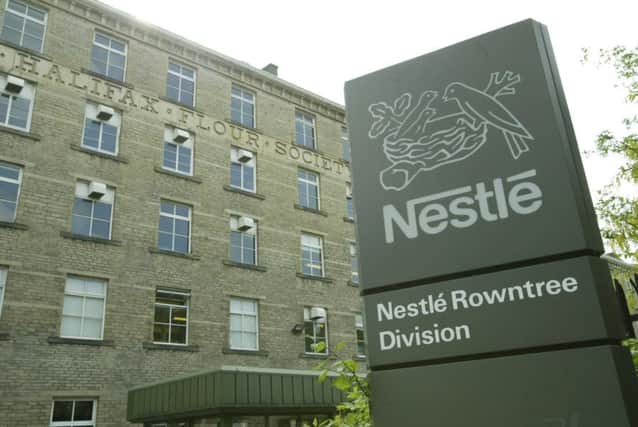Nestle lowers forcest as sales slip two per cent


The firm said a recall of the Swiss firm’s Maggi noodle brand in India knocked sales in recent months, while undercalculated US Skin Health rebates weighed on the company’s profits.
Nestle - which has significant operations in Yorkshire - saw sales drop 2.1 per cent to 64.9 billion Swiss francs (£44bn) in the nine months through September, missing analysts’ forecasts of 65.9 billion.
Advertisement
Hide AdAdvertisement
Hide AdOrganic or underlying growth, adjusted for currency swings, acquisitions and divestitures, slowed to 4.2 per cent in the period from 4.5 per cent in the first half, sliding further behind its 5 per cent target for 2015.
The company cut its 2015 outlook to around 4.5 per cent, below its long-term model calling for five to six per cent growth.
Nestle earlier this month confirmed it was in advanced talks to merge its international ice cream business with R&R Ice Cream, in its latest effort to refocus on other, higher-performing brands and advance its goal of becoming a “nutrition, health and wellness” company.
“The shortfall comes from pricing, as Nestle does not seem to have been able to pursue its pricing actions as hoped, and more importantly the issue seems to be again the Asia, Oceania, Australia region, with sales down in the third quarter,” Barclays analysts said.
Advertisement
Hide AdAdvertisement
Hide AdChief executive Paul Bulcke said: “After a good performance in the first half of the year, we were impacted in the third quarter by exceptional events, with Maggi noodles in India and a rebate adjustment in Nestle Skin Health.”
Maggi noodles were subject to a recall in India over safety concerns.
In the United States, frozen food sales began improving after a revamp of Nestle’s Lean Cuisine brand, but this contrasted with lagging sales in China, which showed a slower sales recovery, Bulcke said.
Despite prospects that Europe’s hot summer would have consumers grabbing ice cream out of freezers, sales at the group’s milk products and ice cream unit fell 350 million francs year-on-year to 11 billion.
Advertisement
Hide AdAdvertisement
Hide AdUnilever, the global number one in ice cream, on Thursday posted third-quarter underlying sales up 5.7 per cent, thanks in part to a strong summer. But the Anglo-Dutch group said it expected sluggish global markets to keep weighing on performance.